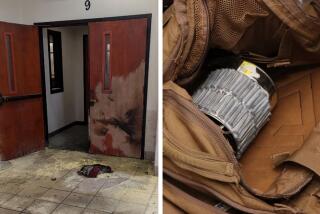Witnesses Tell of McVeigh’s Motive
- Share via
DENVER — A cousin, a friend from his teen-age years, a fellow gun dealer--they and others took the witness stand Thursday and described the transformation of Timothy J. McVeigh from an average kid in upstate New York to a young man angry at his government and desperate to purchase key components of a bomb.
But none of the half-dozen witnesses said that McVeigh actually obtained bomb materials from them--leaving prosecutors able only to suggest McVeigh’s alleged intention to bomb the Alfred P. Murrah Federal Building in Oklahoma City in 1995.
The witnesses talked about McVeigh’s hatred of FBI agents after the 1993 government raid on a religious compound near Waco, Texas, and detailed a series of phone calls he made in search of detonation cord and racing fuel oil in the months before the bombing of the Murrah building.
Gregory Pfaff, a dealer McVeigh met on the gun show circuit, recalled how the former soldier telephoned him seeking to purchase detonation cord for an explosive. “He needed it bad,” Pfaff said.
He said that McVeigh also once told him he was stockpiling weapons. “He said he had some things buried in the woods,” Pfaff said. “In case he ever needed them, he knew where they were and nobody else did.”
Pfaff also said McVeigh was incensed that about 80 people had died at the end of the FBI’s siege on Waco. “He was very agitated about it,” Pfaff said. “He couldn’t believe the government was doing what it was doing, that they had no right to do it.”
David Darlak, who grew up with McVeigh near Buffalo, N.Y., said McVeigh phoned him looking for racing fuel oil--an ingredient the government contends McVeigh wanted to mix with ammonium nitrate to make the truck bomb that killed 168 people.
Darlak said that he had no idea where to find the highly flammable racing fuel oil. But McVeigh pressed him. “He asked me to try,” he said. When McVeigh called back later and Darlak told him that he could not find the fuel, an angry McVeigh hung up, he said.
Darlak also recalled how he and McVeigh once purchased nine acres of wooded land in New York state and said that McVeigh planned to use it as a survivalist campground. “He wanted to build a bomb shelter on it with concrete blocks,” Darlak said. “He was afraid of nuclear war.”
Kyle Kraus, McVeigh’s second cousin, testified that McVeigh sent him anti-government propaganda, including the inflammatory book “The Turner Diaries,” and was disturbed by congressional passage of gun control measures.
“He didn’t want it,” Kraus said in characterizing McVeigh’s intense dislike for the Brady Bill, which is now a law that requires a waiting period before the purchase of handguns. “It wasn’t fair. He didn’t think it was constitutional.”
If convicted, McVeigh could be sentenced to death. His co-defendant and former Army buddy, Terry L. Nichols, is to stand trial later.
The government began its case a week ago with heart-rending stories from victims and rescue workers at the site of the explosion. From there, prosecutors moved into McVeigh’s alleged motive--based primarily on exacting revenge against the government for the raid at Waco.
Prosecutors are attempting to show that McVeigh began trying to gather bomb parts in the fall of 1994, while waiting to destroy the Murrah building on April 19, 1995, the two-year anniversary of the FBI raid at Waco.
Glynn Tipton, a salesman for VP Racing Fuels in Manhattan, Kan., testified that McVeigh approached him at a drag race in Topeka and inquired about rocket fuel. “He wanted a price and availability,” Tipton said.
More to Read
Sign up for Essential California
The most important California stories and recommendations in your inbox every morning.
You may occasionally receive promotional content from the Los Angeles Times.











